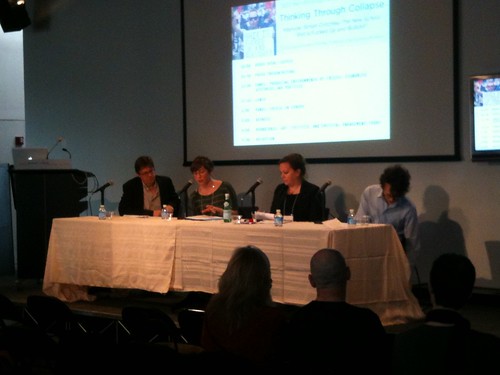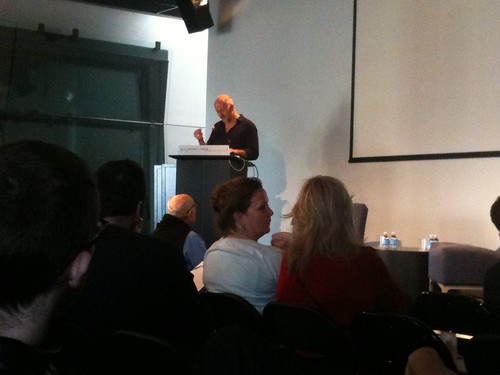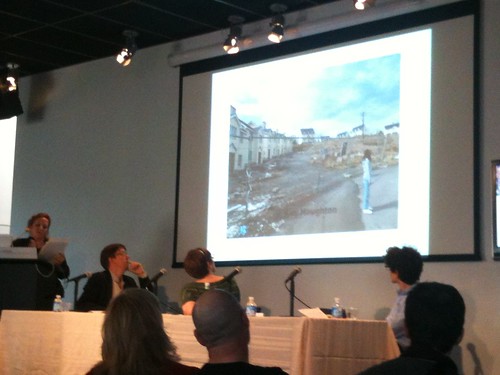Earlier this week Chris S. emailed notice of this year's Neil Postman Graduate Conference, which New York University's Department of Media, Culture and Communication, in the Steinhardt Graduate School of Education. This year's theme and title was "Thinking through Collapse." Since it was free and since I'm around, I decided to attend and did.
 |
| Prof. Benson, Grad students Richard, Garrett, Selimovic |
Named in honor of the department's distinguished, eponymous former and late media studies professor and cultural critic (1931-2003; he taught at NYU from 1952 until 2002, and I had the pleasure of meeting him), this year's conference proceeded from the following premise, which I quote from the conference website:
In the past year we have been confronted with many sites of present and impending collapse: the collapse of oppressive regimes in the Arab world, a global economy pushed to its limits, our own political system in paralysis, the teetering of the fourth estate, continuing environmental collapse and so on. In each of these sites, visions of apocalypse exist alongside those of renewal, inviting the imagination of new forms of organization and sustainability. In the academy, they are prompting new interdisciplinary assessments of the conditions – historical, social, political, economic, cultural, technological – that have brought us to these limits, and are forcing the question: where might we go from here?
There were several talks, panels, and a roundtable, and I stayed for most of the afternoon, the highlights of which for me were a talk by graduate student Claire Richard entitled "Politics of Fiction in Antoine Volodine's Work," which was part of the "Europe in Crisis" panel, and the keynote talk by philosopher, critic, and New School professor Simon Critchley, "Shit Is Fucked Up and Bullshit," which was quite profound despite--or rather, in keeping with--its title.
 |
| Simon Critchley giving his talk |
Richard's paper explored the writings of the pseudonymous Volodine (b. circa 1949-1950), award-winning author of more than 40 books, written as well under the names Elli Kronauer, Manuela Draeger, and Lutz Bassman, and a translator of numerous works from contemporary Russian literature. (Only two of these texts have been translated into English: 1994's Le nom des singes, as Naming the Jungle [1996], and 1999's Prix du Livre Inter winner Des anges mineurs, as Minor Angels [2000].)
Richard began by discussing how fiction might not just be political, but in its thinking through form constitute a form of politics, and went on to show how Volodine's work bore this dictum out. She began by noting its frequent inclusion of scenes set in camps and prisons, or during or after wars of various sorts. She then noted some key elements of the texts which represented Volodine's narrative method: an avowal of post-collapse worlds without revolution as a recourse not as terminal but as sites of possibility; collaging of multiple languages, linguistic registers and genres, its use of plot and character repetitions and elisions, multiple aporias, all as challenges to unified understandings of history or temporality; the inclusion, in condensed form of the entirety of 20th century European history; and the employment of memory, imagination and poetry as ways of opposing "the end." He has even coined his own name for his approach, "post-exotisme," or post-exoticism, which he wrote about in a book Le Post-exotisme en dix leçons, leçon onze (Paris: Gallimard, 1998). Hearing her account of Volodine made me want to read him, and I shall.
Simon Critchley's talk was the afternoon's highlight. Would that all talks of depth be so clear, concise and, for a philosopher and theoretician, relatively jargon-free, or explanatory in terms of the terms when needed. Drawing his title from the placard statement the Occupy Wall Street protester pictured on the conference's poster was carrying around at one point, Critchley launched into a compelling discussion of how power, the ability to get things done, and politics, the means to get things done, had become decoupled, leading to the widespread "vague, diffuse sense of fear" people throughout the West and many other parts of the world now feel, and which had profoundly delegitimated the "nation state" as the location, however imperfect, as the unity of these two major categorical concepts. In so doing this separation has also profoundly undermined the political regime through which we believe power to be based in and lie with (the) people: democracy. Instead, as anyone looking at the European crisis or our own confounding political scene realizes, power is often supranational, and under the control of global capital and finance, information, military-industrial complexes, trafficking of various kinds, and so on. Critchley noted that we still think of and act as if power is "local," but, as the situation in Greece demonstrates so aptly, sovereignty lies elsewhere. Thus the major casualty: the (nation-)state.
I won't recap Critchley's entire talk, which including a great deal of humor, musings about ancient philosophy and Greek democracy, a one-sentence summing up of the history of philosophy's key issue, and so much more, but instead jump to the conclusion, in which he contrasted "representation" with "association," using this as a way to think through the significance of the latter in relation to the Occupy movements' combination of old forms of democratic engagement, such as "assembly, consensus and autonomy" with newer technologies, from digital recording and photography to social media. He was clear about the necessity of education for "politics," and noted how the Occupiers, though criticized for having "no demands" and achieving little--ha!--were actually quite well prepared, and though in some ways autochthonous, also drew from a deep well of resistant political organization and assembly, both within US history and outside. (I thought immediately of the Highlander Folk School and its important, often forgotten role in the Civil Rights movements of the mid-20th century.)
Critchley, a self-described Gramscian, stated that politics is about "articulation" and the "formation of fronts," and pushed towards the question of an "articulation" between political representation in the conventional sense and the Occupy assemblies, though he was careful not to place too much emphasis on the former, having been a former Labour activist in the 1980s and 1990s, only to witness the triumph of the neoliberal, neoconservative British Prime Minister Tony Blair. Politics requires, Critchley said, a demand flowing from a feeling or need for something; and a location, a "terrain where that politics is to be articulated." Association, which he called the key signifier, and present in the work of Rousseau and the later Marx, might be the generator of such a politics rather than representation, though without a location "we're doomed to the abstraction of protest." But locations, spaces, places, often are unanticipated, as Zuccotti Park proved last year. When Wall Street itself was closed off, the park became the locus of association, and as he pointed out, when people know the location or sense it, their (our) association means something.
I was very glad that he cited the Million Hoodie March for Trayvon Martin as part of this; I think about how the rage and frustration about the aftermath of this young man's murder has been building, but with the rally and march beginning in Union Square, one of the key historic sites in American history for public protest and the articulation of various kinds of politics, the protest had a national and symbolic location that the media could not ignore, though they tried to minimize it, as with the Occupy Wall Street and other protests, and as marches in Florida, Philadelphia, and elsewhere are demonstrating, it is compelling the speech and action of those with power, the President, the Justice Department, authorities in Florida, and so on.
I'll conclude by noting that this was the first conference I've ever attended wherein a question and answer session arose out of democratic consensus on how it might be structured. We had the choice of breakout groups or the General Assembly method of stacking comments, and we chose the latter. People spoke, someone kept a tally of who commented, preference went to those without permanent faculty positions, students, university staff, non-academics; and then Critchley responded to the comments in graceful fashion, without antagonism and taking into account the concerns of all who offered thoughts or questions. He urged that those on the left assume the temporality of the long durée as opposed to immediate results (as, I thought to myself, the right have done my entire lifetime) and accept a "refusal of the future," while still fighting for concrete changes in the here and now. He noted that we also should not ever underestimate the "presence of bodies in space," bodies together, in locales like Zuccotti Park or, as I could attest, marching down Michigan Avenue to protest Proposition 8, or through Washington, DC back in 1990s, and so on.
Though we often and rightly think of politics as a mediat(iz)ed spectacle, we should not forget the "excitement of bodies in space," the "pleasure of performing as bodies together." Again, I could point to the power of this just yesterday. He also talked about the paradox of visibility, and how some activists were seeking, in the face of steadily waxing surveillance and panopticism (he didn't use this word, but I immediately thought of it), to secede from visibility while still engaging in association, to achieve even partial modes of anonymity, an increasingly difficult prospect today. He ended with a point that Mohandas Gandhi or Rev. Dr. Martin Luther King Jr. would have made many times over: "Acting peacefully, in concert, anything is possible."
 |
| Yvonne Garrett (l), talking about Irish artistic responses to the collapse |
As so often when I hear a brilliant talk or reading or have an enlightening conversation, I left the conference--which included a final roundtable discussion with several of the graduate students, very energized--somewhat dazzled, unable to stop thinking about the possibilities before us. As always too, I wished that these sorts of conversations, especially in such a clear and compelling form as Critchley engaged in his, were available to the widest array of people out there, people outside academe, though events all over the world have made clear that these ideas are circulating in varying forms. I also wish that there were more people of color in particular at this event, though I took into account how the program possibly developed, which is to say, who is in the graduate pipeline at NYU or similar institutions. Still, I wish a far more diverse group of people were having such conversations inside academe as well as outside it. That is an ongoing struggle as I can attest from my own experiences and those of many I know.
Those criticisms noted, we have seen more than enough "Collapse": of politics and political structures; of global capitalism; of our ability to challenge or arrest supranational agents; of our psyches, of language and nature (think ecocide) themselves. Yet we are not without power, or possibility, and we must not surrender them. Even if we lose the fight, we still possess them, in multiple forms, modes, ways, especially when we come and are together, and we must never forget that.










No comments:
Post a Comment